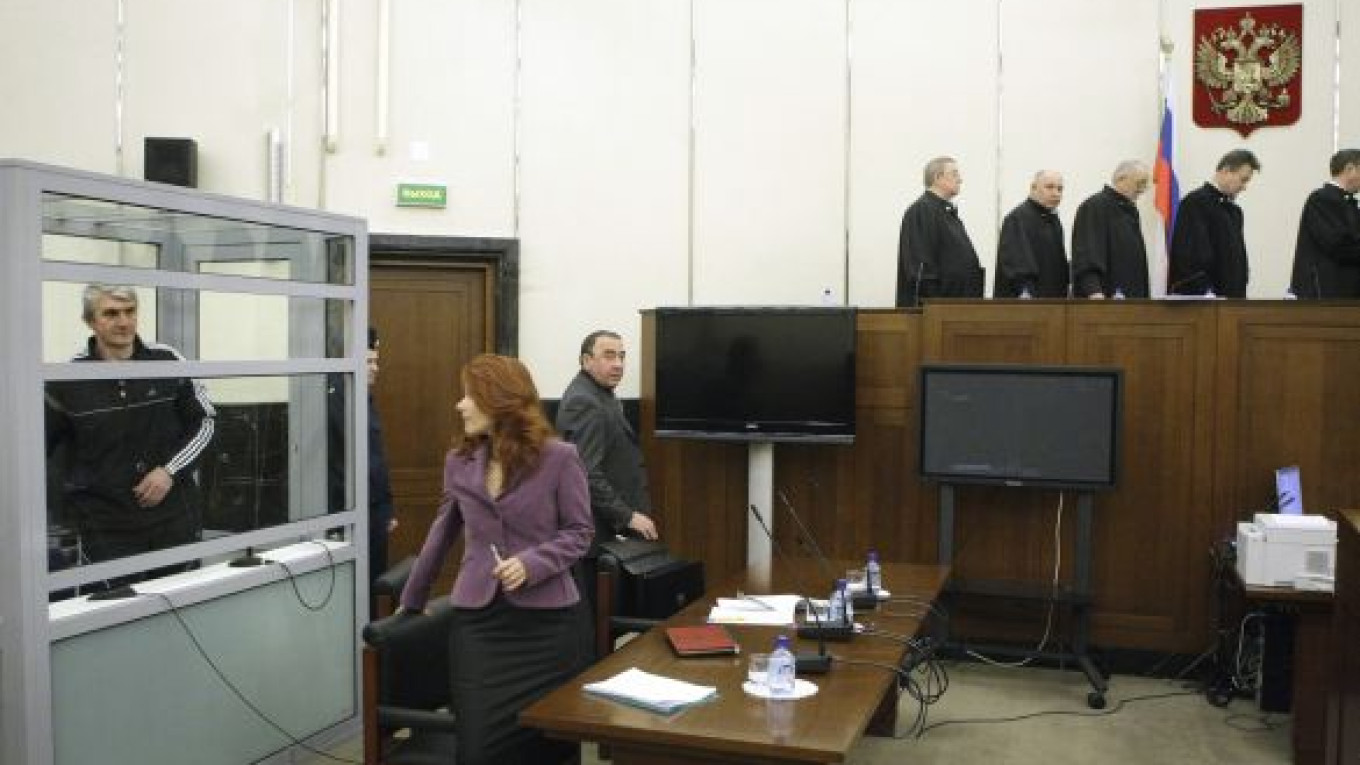The Supreme Court ruled Wednesday that the 2003 arrest of Yukos partner Platon Lebedev was illegal, marking the biggest victory yet for former Yukos owners in their long-running legal fight with the government.
The Supreme Court decision, which follows a similar ruling by the European Court of Human Rights in 2007, does not mean that Lebedev will be freed or that investigators will revisit his 2005 conviction on tax and fraud changes, prosecutors and his lawyers said.
But it does offer hope to Lebedev and former Yukos CEO Mikhail Khodorkovsky that Russian courts might accept future rulings by the European Court of Human Rights, including a $100 billion lawsuit against the Russian government that the court will start considering on Jan. 14.
Lebedev was jubilant about the Supreme Court’s ruling, which said his rights had been violated when a lower Russian court ordered his arrest in 2003, his lawyer Vladimir Krasnov said.
“Platon said that it was a victory,” Krasnov told The Moscow Times.
“But,” he said, “it’s hard to predict now what effect it [the ruling] will have later on.”
Lebedev, wearing his trademark dark tracksuit, arrived in the courtroom against his will, but he was broadly smiling at his defense team a few hours later.
Lebedev asked the court last Friday to postpone Wednesday’s hearing until next year and to excuse him from attending if it was held earlier. “I refuse to take part in the hearing because it is impossible to prepare for it in such a short period of time,” Lebedev said in a statement.
Deputy Prosecutor Viktor Grin, who attended the hearing Wednesday, had little to say about the ruling. Asked whether it meant that Lebedev would be freed, he loudly answered, “No,” and rushed out of the courtroom without commenting further, The Associated Press reported.
He spoke for less than a minute during the hearing and refused to talk to reporters afterward.
Repeated calls to the Supreme Court’s spokesman went unanswered Wednesday afternoon.
It took the presidium of judges in the Supreme Court about an hour to draft the ruling.
Lebedev told the court that despite its ruling, no one has been punished for the violations during his arrest. “No guilty people have suffered for it,” Lebedev said, according to a transcript of the hearing published on the web site Khodorkovsky.ru.
The European Court of Human Rights ruled in 2007 that Lebedev was illegally placed under arrest in 2003 and ordered the Russian government to pay him 10,000 euros ($14,200). Lebedev has said the money would be donated to charity.
The Supreme Court’s ruling “gives a hope that judges will start noticing the European court’s decisions in the framework of the Yukos cases,” Khodorkovsky’s lawyer Vadim Klyuvgant said.
He said it was the Supreme Court’s duty to uphold the European court’s ruling and complained that it had taken the Russian court 18 months to act.
Khodorkovsky has also filed a lawsuit about his arrest with the European court, but it has not been heard yet. Khodorkovsky and Lebedev have also filed lawsuits about their convictions. Both men are serving eight-year sentences.
A Moscow court opened a second trial against the two in March on charges of embezzling more than $25 billion in oil.
President Dmitry Medvedev was to discuss the effectiveness of the European court and other issues with visiting Council of Europe Secretary-General Thorbjorn Jagland on Wednesday, the Kremlin said in a statement. Asked by a journalist about the timing of the Supreme Court’s ruling Wednesday, Jagland said he did not think that it was meant to coincide with his visit. “I would find it strange to suggest that the Supreme Court made its decision to please me,” he said, Interfax reported.
Lilia Shevtsova, who follows the Khodorkovsky trial at the Carnegie Moscow Center, said it was not clear why the court had decided to rule now after an 18-month delay and cautioned about reading too much into the verdict. “The Russian court’s decision just reflects the dual nature of the Kremlin,” she said. “On the one hand, it can’t ignore Strasbourg, but that also doesn’t mean that Lebedev will be released soon.”
Even while the Supreme Court was overturning Lebedev’s arrest, the government’s legal onslaught against Yukos was continuing to unfold. Moscow’s Basmanny District Court on Wednesday ordered the arrest in absentia of former Yukos treasurer Andrei Leonovich on money-laundering charges. Leonovich has lived in Britain since 2004.
Khodorkovsky has dismissed all charges against him and his company as punishment from Vladimir Putin’s Kremlin for his political and business ambitions.
Prime Minister Putin made it clear in a recent televised call-in show that he believed Khodorkovsky should stay in prison. Asked when Khodorkovsky might be released, Putin grew visibly angry and accused Khodorkovsky and other former Yukos officials of murder.
Putin’s spokesman could not be reached for comment on Putin’s reaction to the Supreme Court ruling.
A Message from The Moscow Times:
Dear readers,
We are facing unprecedented challenges. Russia's Prosecutor General's Office has designated The Moscow Times as an "undesirable" organization, criminalizing our work and putting our staff at risk of prosecution. This follows our earlier unjust labeling as a "foreign agent."
These actions are direct attempts to silence independent journalism in Russia. The authorities claim our work "discredits the decisions of the Russian leadership." We see things differently: we strive to provide accurate, unbiased reporting on Russia.
We, the journalists of The Moscow Times, refuse to be silenced. But to continue our work, we need your help.
Your support, no matter how small, makes a world of difference. If you can, please support us monthly starting from just $2. It's quick to set up, and every contribution makes a significant impact.
By supporting The Moscow Times, you're defending open, independent journalism in the face of repression. Thank you for standing with us.
Remind me later.


